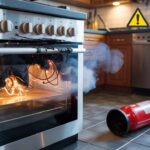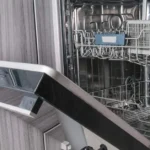Noticing an unusual burning smell from your microwave can be alarming, whether you’re a homeowner in Niceville preparing dinner or a realtor staging a property for sale. This odor might signal anything from simple food splatter to complex electrical faults, each with implications for safety and appliance functionality.
In this guide, we explore the reasons behind a burning smell, provide practical cleaning steps, and clarify when professional microwave repair service is necessary to keep your microwave safe and reliable, especially for properties where appliance performance impacts tenant satisfaction and home value.
What Causes a Burning Smell in My Microwave?
A Microwave Smell Like Burning often arises from food residue, a malfunctioning magnetron, a damaged waveguide cover, or electrical issues like a failing control board. These problems can affect safety and functionality inside of your microwave, posing risks like fire hazards or costly repairs. For property managers, such issues could disrupt tenant comfort or delay real estate transactions. Cleaning can resolve minor odors, but persistent smells, sparking, or no heat indicate deeper problems requiring expert diagnosis to protect homes in Niceville and beyond.
Detailed Reasons for a Microwave Burning Smell
A burning smell in your microwave can stem from various sources, including burnt food or a malfunctioning microwave door. For realtors or homeowners in Niceville, understanding these issues helps maintain safe, functional appliances that enhance property appeal. Below are the primary reasons, with insights into their impact on safety and real estate.
- Food Residue and Burnt Items: Food splatter, especially burnt popcorn, often sticks to the microwave’s interior, including walls, ceiling, or the waveguide cover. When reheated, these residues emit a burning smell, which can be off-putting during home showings, especially if there’s a lingering smell out of your microwave. In rental properties, frequent tenant use increases this risk, making regular cleaning essential to avoid odors affecting buyer perceptions. Neglected residue inside of the microwave can also lead to smoke or minor charring, raising safety concerns.
- Faulty Magnetron: The magnetron generates microwaves to heat food. Wear, power surges, or running the microwave empty can cause it to overheat, producing a microwave smells like burning plastic odor as internal components degrade. This high-voltage part poses safety risks if mishandled, and a failure can stop the microwave from heating, critical for vacation rentals where tenants expect fully functional appliances.
- Damaged Waveguide Cover: The waveguide cover, typically mica or plastic, directs microwaves into the cooking chamber. If cracked or coated with food, it can arc or burn, causing a microwave has rubber burning smell and not hot. This issue reduces heating efficiency and is common in older microwaves or high-use rentals. Replacing the cover restores functionality and safety.
- Electrical Component Failures: Several electrical parts can trigger a burning smell:
- Control Board: This component manages power levels, cooking times, and other functions related to the microwave magnetron. A shorted board can overheat, emitting a burning odor and causing clicking noises or no heat. For homeowners, this can disrupt daily use and signal a need for professional repair.
- High-Voltage Capacitor and Diode: These parts work together to supply power to the magnetron, ensuring no burning smell inside the microwave. A faulty capacitor or diode can overheat, producing a burning smell and preventing heating. These parts store high voltage, making them dangerous for DIY repairs, especially if there’s a burning smell coming from the microwave.
- Fan Bearing Wear: The cooling fan prevents overheating of internal components. Worn bearings can cause the fan to seize, leading to excessive heat and a burning smell. This may trigger safety mechanisms like thermal fuses, shutting down the microwave, a concern for Niceville property managers.
- Overheated Transformer: The high-voltage transformer powers the magnetron. A failure can cause arcing or overheating, resulting in a burning odor. This is a serious safety issue, especially in rentals, where reliable appliances are vital for tenant satisfaction.
- Burnt Door Switch: Microwaves have multiple door switches to ensure safe operation. A burnt switch, often due to loose connections or wear, can produce a burning smell and prevent the microwave from starting. This issue can delay home sales if not addressed promptly.
- Wiring Issues: Loose or damaged internal wiring can overheat, causing a burning smell. This is less common but serious, as it increases fire risks, particularly in high-use settings like vacation homes.
A real-world example: a property manager noticed a burning smell in a rental microwave. After cleaning failed, a technician found a damaged microwave waveguide cover, which was replaced to ensure the unit was ready for new tenants. Identifying the cause early prevents disruptions in competitive real estate markets.
Steps to Clean Burnt Smell from Microwave
If the burning smell is due to food residue, cleaning can often eliminate it, saving time and money for homeowners in Niceville or realtors prepping properties. This approach enhances appliance appearance and functionality, crucial for open houses. Follow these detailed steps to get burnt smell out of microwave safely.
- Prepare for Cleaning: Unplug the microwave to eliminate electrical risks. Gather supplies: water, white vinegar, baking soda, lemon juice, a microwave-safe bowl, a non-abrasive sponge, a soft cloth, and dish soap for cleaning your microwave. Check the user manual to identify removable parts like the turntable. These household items are cost-effective, ideal for homeowners maintaining multiple properties.
- Steam with Vinegar or Lemon: Place 1 cup of water and 1 tablespoon of white vinegar in a microwave-safe bowl. Vinegar breaks down grease and odors effectively inside of your microwave. Microwave for 5 to 7 minutes to create steam, loosening stuck-on food. Let it sit for 15 minutes. Alternatively, use 1 tablespoon of lemon juice or a sliced lemon for a fresh scent, which is appealing for rentals. This step helps remove burnt popcorn smell from microwave.
- Clean the Turntable: Remove the turntable and its support ring. Wash with warm water and dish soap or in a dishwasher if the manual confirms it’s safe. Dry thoroughly to prevent odor recirculation, a key step for properties aiming to impress buyers and eliminate any smell coming from your microwave.
- Wipe the Interior: Use a soft cloth or non-abrasive sponge with mild soap to clean the walls, ceiling, door, and waveguide cover. Focus on the waveguide cover, avoiding damage to its delicate material. For stubborn stains, dip the sponge in warm soapy water and scrub gently. Avoid metal scrubbers to prevent sparking inside of your microwave, ensuring safety for homeowners.
- Deodorize with Baking Soda: Mix 2 tablespoons of baking soda with 1 cup of water in a microwave-safe bowl. Microwave for 5 minutes, then let it sit for 10 minutes. Wipe the interior with a clean cloth to get rid of the burnt smell coming from your microwave. For persistent odors, leave an open box of baking soda inside the unplugged microwave overnight.
- Clean the Charcoal Filter: Over-the-range microwaves often have a charcoal filter to absorb odors. Check the manual to locate it, typically behind a vent. Clean with mild soap if reusable, or replace if damaged. A clean microwave’s charcoal filter improves air quality, vital for vacation homes.
- Final Inspection: After cleaning, inspect for remaining odors or stains. Repeat steaming if needed. A clean microwave enhances appeal during showings, signaling well-maintained appliances.
When Professional Microwave Repair Is Needed

Cleaning may not resolve all burning smells, especially if technical issues are involved. For realtors or property managers in Niceville, a faulty microwave can delay sales or affect tenant satisfaction. Below are signs indicating professional repair is necessary, along with what to expect.
- Persistent Odors After Cleaning: If the smell remains despite thorough cleaning, components like the magnetron, capacitor, or control board may be overheating, producing a microwave smells like burning plastic odor. These require specialized tools for diagnosis to prevent fire risks.
- Sparking or No Heat inside the microwave: Sparks or failure to heat suggest issues with the magnetron, diode, or waveguide cover. These high-voltage parts store electricity, making professional repair essential for safety. For properties, quick fixes ensure appliances pass inspections.
- Unusual Noises or Power Issues: Clicking, buzzing, or failure to start may indicate a failing control board or transformer. These disruptions affect functionality, a concern for homeowners relying on daily appliance use.
- Safety Risks: Microwaves contain capacitors that retain high voltage even when unplugged, posing electric shock risks. Technicians use discharge tools and diagnostic equipment to address issues like a microwave that has a rubber burning smell and is not hot, including checking the microwave diode.
A realtor recently faced a microwave with a burning smell and no heat inside the microwave during a home staging. A technician identified a faulty diode, replacing it to ensure the property was sale-ready. Professional appliance repair service is critical for real estate professionals in Niceville, where reliable kitchen appliances boost property value.
Preventing Future Microwave Odors
Proactive maintenance prevents burning smells and extends your microwave’s lifespan, a priority for homeowners and property managers. These tips ensure appliances remain functional and appealing.
- Clean Regularly: Wipe spills immediately with a damp cloth and mild soap. Monthly deep cleaning prevents residue buildup, crucial for rentals with frequent tenant turnover.
- Avoid Empty Operation: Running a microwave without food or liquid damages the magnetron, causing overheating and odors. Always include a microwave-safe item, even for short cycles.
- Use Safe Containers: Avoid metal or non-microwave-safe plastics, which can spark or melt, leading to a how to remove smoke odor from microwave. Glass or ceramic containers are safer, enhancing safety for homes.
- Check Door Seals: Inspect door seals monthly for wear. Damaged seals cause arcing or uneven heating, increasing odor risks. This is vital for properties undergoing inspections.
- Monitor Usage: Limit continuous operation in high-use settings. Allow cooling between cycles to prevent overheating.
- Maintain Charcoal Filters: For over-the-range microwaves, check filters every 6 months. Replace dirty filters to how do you deodorize a microwave oven, improving air quality for rentals.
- Inspect Regularly: Periodic professional inspections catch early wear, preventing costly repairs. For realtors, this ensures kitchen appliances meet buyer expectations.
A Niceville homeowner adopted these habits, reducing odor complaints and maintaining their microwave for over a decade, enhancing their property’s appeal.
Ensuring Microwave Safety and Reliability
A Microwave Smell Like Burning can signal minor issues like food residue or serious faults like a failing magnetron. For homeowners in Niceville or realtors, addressing this promptly maintains safety and property appeal. Cleaning with vinegar, lemon juice, or baking soda resolves food-related odors, while persistent smells require professional diagnosis to prevent hazards. Regular maintenance, such as cleaning spills and checking door seals, prevents future issues, especially in high-use rentals. A realtor shared how a timely microwave repair ensured a listing passed inspection, delighting buyers. For expert microwave repair service in Niceville, contact Beach2Bay Appliance repair service in Niceville to keep your appliances safe and functional.
FAQs About Microwave Burning Smells
Homeowners and realtors in Niceville and surrounding areas often have questions about microwave safety and maintenance. Below are answers to common concerns, tailored to your needs.
Is a burnt microwave safe to use, or should it be considered for appliance repair?
If the smell comes from food residue, clean thoroughly before use. Persistent odors or sparking indicate electrical issues, so stop using the microwave and seek microwave repair Niceville to ensure safety for tenants or buyers.
How to get rid of burning smell inside of your microwave?
Steam with 1 cup of water and 1 tablespoon of vinegar or lemon juice for 5 to 7 minutes, then wipe the interior. Use baking soda to clean burnt smell from microwave. Persistent smells require professional inspection.
How do you know when a microwave is unsafe?
Sparking, no heat, buzzing, or persistent burning smells signal hazards like faulty components. For properties, an inspection ensures tenant safety and sale readiness.
When should you throw out your microwave?
Replace if repair costs exceed 50% of a new unit’s price, typically $150, or if the microwave is over 10 years old. This is cost-effective for the realtors enhancing property value.
Is it worth fixing a microwave?
Repairs for minor issues like waveguide covers, costing $50 to $100, are worthwhile. Major faults in older units may justify replacement for homeowners.
What is the average cost to repair a microwave?
Costs range from $50 to $150 for parts like door switches, or $100 to $300 for magnetrons. Labor in microwave repair typically adds $50 to $100.
Is it easy to replace a microwave magnetron?
Magnetron replacement involves high-voltage risks, requiring professional expertise. Technicians in Niceville ensure safe, efficient repairs.
How do you know when a microwave needs replacing, especially if it has smells burnt?
Frequent breakdowns, age over 10 years, or costly repairs like control board failure suggest replacement, especially for vacation homes.
What shortens the life of a microwave?
Neglecting cleaning, empty operation, or using improper containers damages components. Regular maintenance extends life for all properties.
What causes a magnetron to fail?
Overheating, power surges, or empty operation can cause magnetron failure, often producing a burning smell. Professional repair ensures safety in every home.
Author Profile
- John Raymond Hagler
- Beach2Bay Appliances is a trusted name in Florida for professional appliance repair services. Serving homeowners, realtors, and property managers, our experienced team focuses on reducing costly breakdowns and maximizing appliance efficiency. Committed to reliability, transparency, and customer care, we help maintain the value and functionality of homes and rental properties through routine service and urgent repairs.
Latest entries
 BlogsAugust 30, 2025Oven Smells Like Burning While Cooking? Here’s the Solution
BlogsAugust 30, 2025Oven Smells Like Burning While Cooking? Here’s the Solution BlogsAugust 29, 2025Why Your Dishwasher Isn’t Cleaning Dishes and How to Fix It
BlogsAugust 29, 2025Why Your Dishwasher Isn’t Cleaning Dishes and How to Fix It BlogsAugust 29, 20257 Reasons Your Microwave Isn’t Working and How to Fix It Quick
BlogsAugust 29, 20257 Reasons Your Microwave Isn’t Working and How to Fix It Quick BlogsAugust 27, 2025Why Your Refrigerator Isn’t Cooling and How to Fix It
BlogsAugust 27, 2025Why Your Refrigerator Isn’t Cooling and How to Fix It
